The other day, I helped a client whose father has Alzheimer’s. She and her sibling have enabled him to live at home over the last several years by checking on him daily, bringing over food, and keeping a close watch over him.
Over the last few months, there were enough incidents that proved to them that he was no longer safe at home. My client said that making the call to Silver Age was incredibly difficult. I honored that statement because I understood that on a personal basis.
Both siblings were consumed with guilt. They felt guilty about moving their beloved father to Assisted Living. I know that guilt because I have been through it with my father. If I am being honest, I am still occasionally consumed with guilt over my dad being in an Adult Family Home.

Intellectually, we know that the right care setting will keep our loved one safe, fed, and cared for, but emotionally we feel guilty. We wish we had the time and energy to care for our parent(s), but it’s not that simple. Those of us who have attempted to become caregivers understand how incredibly challenging it is. Guilt was/is the number one emotion I felt, followed by frustration. By frustration, I am referring to the resistance I faced when my parents needed to go into a care-type setting. There was an incredible amount of stress on our relationship during that time. In retrospect, “tough love” is much easier to implement with our children than with our own parents.
I believe that compassion and understanding are the keys to a smooth transition. With compassion and understanding, families can go beyond the basics of finding the best care and housing options for their loved ones and embrace their new role as advocates. When I work with clients, we spend time talking about the upcoming transition so they can begin preparing for what the first few months may look like following the move. We talk a lot about the partnership with the new care team.
The goal in every instance is for the vulnerable adult to feel happy and secure in their new community and for the adult children to feel a sense of relief because their loved one is safe and taken care of. Being able to visit our loved one as a “daughter” or “son” as opposed to a “caregiver” is such a healthy feeling.
If you are facing a transition with your loved one, you are not alone. I would be honored to walk through this with you.





